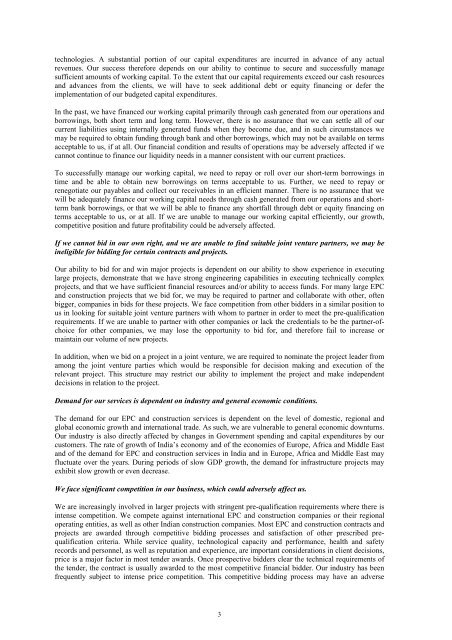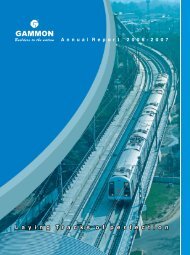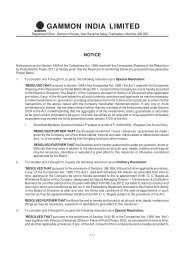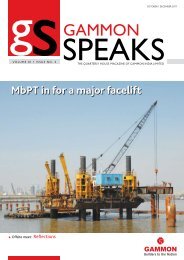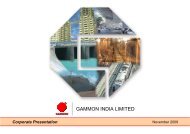GAMMON INDIA LIMITED
GAMMON INDIA LIMITED
GAMMON INDIA LIMITED
You also want an ePaper? Increase the reach of your titles
YUMPU automatically turns print PDFs into web optimized ePapers that Google loves.
technologies. A substantial portion of our capital expenditures are incurred in advance of any actual<br />
revenues. Our success therefore depends on our ability to continue to secure and successfully manage<br />
sufficient amounts of working capital. To the extent that our capital requirements exceed our cash resources<br />
and advances from the clients, we will have to seek additional debt or equity financing or defer the<br />
implementation of our budgeted capital expenditures.<br />
In the past, we have financed our working capital primarily through cash generated from our operations and<br />
borrowings, both short term and long term. However, there is no assurance that we can settle all of our<br />
current liabilities using internally generated funds when they become due, and in such circumstances we<br />
may be required to obtain funding through bank and other borrowings, which may not be available on terms<br />
acceptable to us, if at all. Our financial condition and results of operations may be adversely affected if we<br />
cannot continue to finance our liquidity needs in a manner consistent with our current practices.<br />
To successfully manage our working capital, we need to repay or roll over our short-term borrowings in<br />
time and be able to obtain new borrowings on terms acceptable to us. Further, we need to repay or<br />
renegotiate our payables and collect our receivables in an efficient manner. There is no assurance that we<br />
will be adequately finance our working capital needs through cash generated from our operations and shortterm<br />
bank borrowings, or that we will be able to finance any shortfall through debt or equity financing on<br />
terms acceptable to us, or at all. If we are unable to manage our working capital efficiently, our growth,<br />
competitive position and future profitability could be adversely affected.<br />
If we cannot bid in our own right, and we are unable to find suitable joint venture partners, we may be<br />
ineligible for bidding for certain contracts and projects.<br />
Our ability to bid for and win major projects is dependent on our ability to show experience in executing<br />
large projects, demonstrate that we have strong engineering capabilities in executing technically complex<br />
projects, and that we have sufficient financial resources and/or ability to access funds. For many large EPC<br />
and construction projects that we bid for, we may be required to partner and collaborate with other, often<br />
bigger, companies in bids for these projects. We face competition from other bidders in a similar position to<br />
us in looking for suitable joint venture partners with whom to partner in order to meet the pre-qualification<br />
requirements. If we are unable to partner with other companies or lack the credentials to be the partner-ofchoice<br />
for other companies, we may lose the opportunity to bid for, and therefore fail to increase or<br />
maintain our volume of new projects.<br />
In addition, when we bid on a project in a joint venture, we are required to nominate the project leader from<br />
among the joint venture parties which would be responsible for decision making and execution of the<br />
relevant project. This structure may restrict our ability to implement the project and make independent<br />
decisions in relation to the project.<br />
Demand for our services is dependent on industry and general economic conditions.<br />
The demand for our EPC and construction services is dependent on the level of domestic, regional and<br />
global economic growth and international trade. As such, we are vulnerable to general economic downturns.<br />
Our industry is also directly affected by changes in Government spending and capital expenditures by our<br />
customers. The rate of growth of India’s economy and of the economies of Europe, Africa and Middle East<br />
and of the demand for EPC and construction services in India and in Europe, Africa and Middle East may<br />
fluctuate over the years. During periods of slow GDP growth, the demand for infrastructure projects may<br />
exhibit slow growth or even decrease.<br />
We face significant competition in our business, which could adversely affect us.<br />
We are increasingly involved in larger projects with stringent pre-qualification requirements where there is<br />
intense competition. We compete against international EPC and construction companies or their regional<br />
operating entities, as well as other Indian construction companies. Most EPC and construction contracts and<br />
projects are awarded through competitive bidding processes and satisfaction of other prescribed prequalification<br />
criteria. While service quality, technological capacity and performance, health and safety<br />
records and personnel, as well as reputation and experience, are important considerations in client decisions,<br />
price is a major factor in most tender awards. Once prospective bidders clear the technical requirements of<br />
the tender, the contract is usually awarded to the most competitive financial bidder. Our industry has been<br />
frequently subject to intense price competition. This competitive bidding process may have an adverse<br />
3


